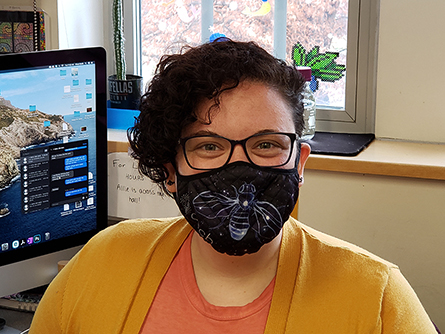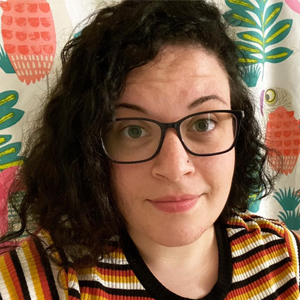Redirecting my COVID-19 anxiety into service
The first time I heard the term COVID-19, I didn't think about getting sick or what would happen if we were quarantined — let alone still masked and social distancing after more than 300 days and counting. As I felt anxiety bubble up inside me like too much yeast paste added to the tube, I thought about my students and whether or not they'd be OK.

She could take care of herself and do most of her work from home, and she realized
she was privileged to have the resources to do so.
I am all too familiar with this feeling; I live with generalized anxiety disorder. As soon as the pandemic led to a quarantine, I could feel my anxiety roar from inside of me as I worried about my every move. This is when I realized that I needed to start redirecting this anxiety.
For the last five semesters, I've been an associate instructor for an introductory biology laboratory course at Indiana University Bloomington. Last spring, my 25 students ranged from first-years to seniors. As the pandemic began, we thought we would be online for a week, which then became a month, then the rest of the semester. As soon as I realized I wouldn't be able to see my students and check in with them in person, I was concerned. I decided to proactively redirect this paralyzing concern. I often use this redirection strategy in my day-to-day life to lessen my anxiety; I delve into the thing in life that I love as much as science: service.
I started by contacting all my students on Canvas each week with a little message. I'd remind them what would be due over the next week and ask them what they were doing at home to take care of themselves physically, mentally and spiritually. I'd end by telling them something I had been doing (usually an update on how my Animal Crossing island was progressing).
Immediately, I started getting messages from students with updates on their Animal Crossing islands, recipes for new desserts they were cooking, suggestions for TV shows or podcasts they were using to decompress, updates on learning to rollerblade (being sure to say they were wearing pads and a helmet) and so on.
What really caught me off guard was that the students thanked me for checking in on them and asked what other students in the class were doing to take care of themselves; they wanted suggestions for things they also could try. With this in mind, I shared everyone's self-care activities in an announcement called "How Allie's Section of L113 is Surviving COVID-19." This document included our amazing recipes, cautionary rollerblading tales and Animal Crossing: New Horizons tips.
I knew that I would be OK — I had people checking in on me. I was able to take care of myself and do most of my work from home, and I was privileged to have the resources to do so. As our fully in-person laboratory course switched into a fully online laboratory course, however, I learned I had students who did not have the technology required to complete their assignments.
One student emailed me referring to himself as a "burden" for his professors because he didn't have access to a computer with word processing or Wi-Fi. He wanted to know if he could handwrite the assignments, take a picture of the handwritten document and submit that image. I was sad that this was a concern for my student, and more than that, I was enraged that in 2020 there was not a way for the university to help my student with his technology needs.
Another associate instructor and I were inspired by this to create the IUpcycle program. With sponsorship from the biology department and the Center of Excellence for Women & Technology at IUB, we started a program where students, staff and faculty can donate used but functional technology that can be upcycled to students, staff and faculty who may not have the means to obtain the technology they need. We did this with the hope that no student ever again would feel the need to refer to themselves as a burden. Since the program launched in November, we have received 10 functional laptops to upcycle.
In the time of COVID-19, when we all already are concerned about the survival of ourselves and our loved ones, the last thing someone should be worried about is whether they have the technology to write a story as I did today.
Since we started IUpcycle, my anxiety no longer bubbles so intensely that it roars inside me; now it bubbles ever so slightly, saying, "What is our next adventure?"
Enjoy reading ASBMB Today?
Become a member to receive the print edition four times a year and the digital edition monthly.
Learn moreGet the latest from ASBMB Today
Enter your email address, and we’ll send you a weekly email with recent articles, interviews and more.
Latest in Opinions
Opinions highlights or most popular articles

Women’s health cannot leave rare diseases behind
A physician living with lymphangioleiomyomatosis and a basic scientist explain why patient-driven, trial-ready research is essential to turning momentum into meaningful progress.

Making my spicy brain work for me
Researcher Reid Blanchett reflects on her journey navigating mental health struggles through graduate school. She found a new path in bioinformatics, proving that science can be flexible, forgiving and full of second chances.

The tortoise wins: How slowing down saved my Ph.D.
Graduate student Amy Bounds reflects on how slowing down in the lab not only improved her relationship with work but also made her a more productive scientist.

How pediatric cataracts shaped my scientific journey
Undergraduate student Grace Jones shares how she transformed her childhood cataract diagnosis into a scientific purpose. She explores how biochemistry can bring a clearer vision to others, and how personal history can shape discovery.

Debugging my code and teaching with ChatGPT
AI tools like ChatGPT have changed the way an assistant professor teaches and does research. But, he asserts that real growth still comes from struggle, and educators must help students use AI wisely — as scaffolds, not shortcuts.

AI in the lab: The power of smarter questions
An assistant professor discusses AI's evolution from a buzzword to a trusted research partner. It helps streamline reviews, troubleshoot code, save time and spark ideas, but its success relies on combining AI with expertise and critical thinking.

